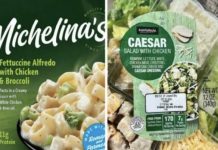
Aug. 28 (UPI) — Amazon took over as the owner of Whole Foods on Monday, and immediately slashed prices.
“Starting Monday, Whole Foods Market will offer lower prices on a selection of best-selling staples across its stores, with much more to come,” the Amazon said in a press release.
Bloomberg reported that prices Monday were down by as much as 43 percent.
At the store on East 57th Street in Manhattan, signs listed the old price, the new price and “More to come…”. Orange signs for the marked-down items read “Whole Foods + Amazon.”
That included organic fuji apples marked down to $1.99 a pound from $3.49 a pound; organic rotisserie chicken to $9.99 each from $13.99; and some bananas was slashed to 49 cents per pound from 79 cents. Even the Amazon Echo, a voice-activated electronic assistant, was being sold for $99.99.
“It reminded me why I shop at Amazon,” Simon Salamon, 60, said at the Manhattan store. “Ninety-nine percent of the time they have the best prices and their return policy is great. With the prices lower, I think we’re more likely to shop here every day.”
The online retailer purchased the brick-and-mortar premium food chain for $13.7 billion in June, and the deal received federal approval last week.
Business Insider visited a Whole Foods location in Brooklyn, N.Y., on Friday and Monday.
On Friday, 15 items were priced at $97.76. On Monday, the tab was $75.75, a 23 percent reductions.
“Price was the largest barrier to Whole Foods’ customers,” Mark Baum, a senior vice president at the Food Marketing Institute, told Bloomberg. “Amazon has demonstrated that it is willing to invest to dominate the categories that it decides to compete in. Food retailers of all sizes need to look really hard at their pricing strategies, and maybe find some funding sources to build a war chest.”
Amazon is trying to be more price competitive with Walmart, Kroger and Costco in the $800 billion supermarket industry. And those companies, in turn, are responding with changes.
Costco has organic items priced about 30 percent cheaper than the same products at Whole Foods, according to Sanford Bernstein, an asset management company
Walmart, which has been ramping up its online operation, has added more fresh-cut fruit and is rolling out curbside pickup.
Kroger is the No. 1 supermarket chain by revenue of $115.3 billion in 2016, with brands that include Fry’s, Ralphs, Smith’s, Fred Meyer and Food 4 Less.
“We have the human connection, assets, scale and expertise to win with customers and we are leveraging our deep expertise in data to provide value and build loyalty — so we can continue to serve customers anything, anytime and anywhere,” Kroger spokeswoman Kristal Howard said.
Whole Foods has more than 460 stores in the United States, Canada and Great Britain, and recorded sales of $16 billion last year. With 87,000 workers, it has been ranked for 20 consecutive years as one of the “100 Best Companies to Work For” in the United States by Fortune.
“This is just the beginning — Amazon and Whole Foods Market plan to offer more in-store benefits and lower prices for customers over time as the two companies integrate logistics and point-of-sale and merchandising systems,” Amazon said.
Amazon Prime will become Whole Foods Market’s customer rewards program, providing members with special savings and other in-store benefits.





